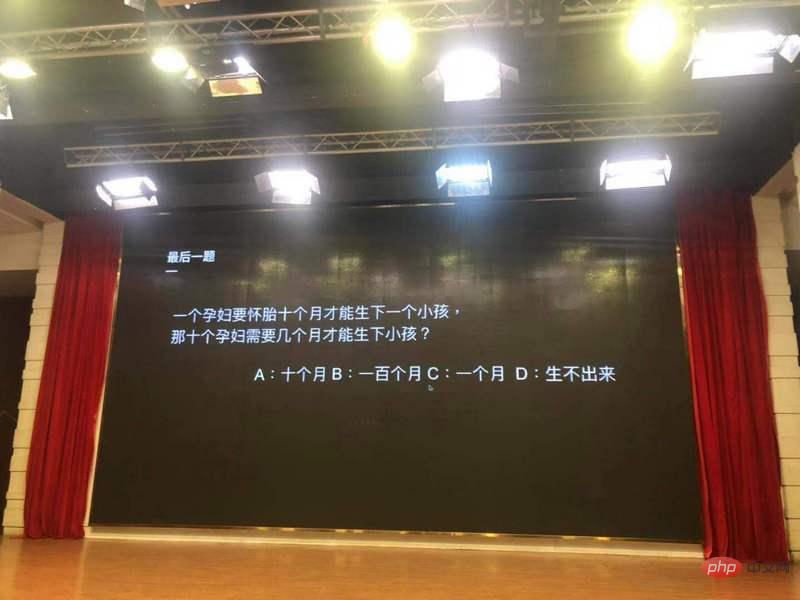PHPConChina 2019 Participation Insights

The long-awaited PHPCON2019 has finally been held. The conference has continued the tradition of rain. However, this year we encountered a typhoon and the weather was extremely worse than before. It is estimated that there were many buyers. It’s a pity that friends who bought tickets can’t attend. There were many celebrities and big names at this conference, including Niao Ge (video conference), Han Tianfeng, Hong Tao, Guo Xinhua, Zhuang Biaowei, Gao Xu, etc., all present. Overall, there are quite a lot of people coming. A total of 12 topics were covered at the conference. I took scattered notes during the lecture and compiled them into a blog.
Theme
● "Swoole5 takes PHP to the distance" -- Han Tianfeng
Mainly This explanation of Swoole4.4 version introduces some open source PHP coroutine frameworks as a prospect for Swoole5.
●"Sharing some experiences of Weibo on burst traffic" - Hu Bo
Hu Bo Daniel interestingly explained the relationship between Weibo and Weibo in the past two years "Celebrities' Struggles with Breakups in Love" mainly introduces the application of Weibo's anti-collapse system (difuse). I hope it can be open sourced for everyone to learn from.
●"Practical Combat of Messaging Service in China" - Wang Jing
It is more practical application, and it is a theme that I personally like.
The main content includes the evolution of the actual architecture of the middle platform. There are two core ROIs and business replication in the middle platform architecture. The ideas include multiple accesses, infinite expansion channels, data analysis, stability and bypass systems. . The message distribution layer distributes different channels based on type and channel. In terms of security, strategic management and control are carried out from various dimensions such as time, duplication, frequency, blacklist, quantity, city, and content.
●"Embracing TARS: Building a PHP Microservice Ecosystem" - Liang Chen
Mainly introduced the overall architecture of TARS microservices, without taking notes on the specific content. We have compiled some useful channels:
tars video tutorial: https://www.bilibili.com/video/av47290510/
tars project address: https ://github.com/TarsPHP/TarsPHP
Use mirrors to quickly build an environment: https://github.com/TarsCloud/TarsDocker
FAQ faq: https://github.com/TarsPHP/TarsPHP/blob/master/TARS-PHP-FAQ.md
Issue template: https://github.com /TarsPHP/TarsPHP/blob/master/TARS-PHP-ISSUE.md
Gitbook: https://tarsphp.gitbook.io/doc/
If you have any difficult questions, try to raise them on github.com/tarscloud. Github can settle the questions so that people who use them later can search for them.
● "PHP Resident Process Programming Instructions" - Guo Xinhua
I remembered a few scattered points: tool positioning blocking, ptrace principle, profile tool, code optimization, etc.
●"PHP's Business Practice in 2345" - Gao Xu
The content that Xu Ge talks about is also more practical, and it is also a topic that I personally like. The content mainly includes: basic business services such as real-time server monitoring and real-time viewing and warning of business logs; business risk monitoring: code avoidance and inspection, code management and release, business efficiency improvement, real-time online code monitoring, etc.; business scenario practice: real-time data processing , Massive data push architecture design, system optimization experience, and application optimization experience.
●"Brother Bird's Speech"
Unfortunately, Brother Bird was unable to attend the event this year due to typhoon weather. . . However, Brother Niao also held a video conference, mainly talking about what happened in the PHP community this year, and answering questions from some peers.
●"Interesting Questions and Answers" — Fan Shengyou
This link is a very interactive part. Some questions and answers have really enlivened the atmosphere of the scene. I regret that I I answered 2 questions, one was answered slowly, and the other was answered incorrectly because I read the wrong order, so I unfortunately missed the prize. .

●"Cracking the Objective Observability of Cloud Native Applications" - Liu Zheng
I was really sleepy around 2 o'clock, so I didn't How to listen. . .
●"Collective Learning of a Team" - Chen Lei
I bought the book "PHP7 Underlying Design and Source Code Implementation" on Double Eleven last year. I learned about the story of Chen Lei Daniu and the Didi team in the preface, and I admired it very much. It can be seen that an excellent team is of great help to personal growth, and personal self-discipline and perseverance are also very important. Overall, there is a passage in the next two paragraphs that impressed me deeply. The general meaning is: "The so-called thirty years in Hedong and thirty years in Hexi. From 1919 to 1949, the entire Chinese society was on an upward trend. From 1949 to 1979, the society was on a downward trend. From 1979 to In 2009, society was on an upward trend again. From 2009 to now, there is some downward trend. When the overall market is not good, as long as we continue to make breakthroughs and improve ourselves, it will be easier to stand out."
●《 People use it every day but don’t know it - Let’s talk about the other side of open source” - Zhuang Biaowei
Mr. Zhuang comes from Huawei Cloud, but unfortunately he hasn’t heard some of Huawei’s stories. What impressed me most was that during the QA session, someone asked about the development of Huawei’s 5G and asked Mr. Zhuang to predict the development trend of the technology. Mr. Zhuang’s answer was also very good – “As a programmer, you must go deep into the bottom layer to look at the source code. You won’t be unemployed because you really understand.”
Summary
The two days passed very quickly, and the meeting was also I learned that many people have come to attend the conference for 2-3 consecutive years, which shows that there are still many people who maintain continued enthusiasm for PHP. I have the impression that many people ask Brother Niao what he thinks of PHP, and whether learning PHP requires mastering other programming languages, etc. Let me talk about my personal opinion. It is necessary to master multiple technology stacks. There is no right or wrong language, just make different choices in different scenarios. In addition, I feel deeply that excellent Didi teams like Chen Lei are studying so hard (arrive 100 minutes early every day to study the source code), and we should work harder to stand higher and go further.
Original text from: https://tsmliyun.github.io/life/PHPCON2019 Participation Insights/ Thanks to the author!
Related recommendations:
PHP 7.4 is expected to be released in December 2019
2019Why do we continue to use PHP?
Why do programmers hack PHP? PHP Chinese website has something to say!

Hot AI Tools

Undresser.AI Undress
AI-powered app for creating realistic nude photos

AI Clothes Remover
Online AI tool for removing clothes from photos.

Undress AI Tool
Undress images for free

Clothoff.io
AI clothes remover

Video Face Swap
Swap faces in any video effortlessly with our completely free AI face swap tool!

Hot Article

Hot Tools

Notepad++7.3.1
Easy-to-use and free code editor

SublimeText3 Chinese version
Chinese version, very easy to use

Zend Studio 13.0.1
Powerful PHP integrated development environment

Dreamweaver CS6
Visual web development tools

SublimeText3 Mac version
God-level code editing software (SublimeText3)

Hot Topics
 PHP 8.4 Installation and Upgrade guide for Ubuntu and Debian
Dec 24, 2024 pm 04:42 PM
PHP 8.4 Installation and Upgrade guide for Ubuntu and Debian
Dec 24, 2024 pm 04:42 PM
PHP 8.4 brings several new features, security improvements, and performance improvements with healthy amounts of feature deprecations and removals. This guide explains how to install PHP 8.4 or upgrade to PHP 8.4 on Ubuntu, Debian, or their derivati
 7 PHP Functions I Regret I Didn't Know Before
Nov 13, 2024 am 09:42 AM
7 PHP Functions I Regret I Didn't Know Before
Nov 13, 2024 am 09:42 AM
If you are an experienced PHP developer, you might have the feeling that you’ve been there and done that already.You have developed a significant number of applications, debugged millions of lines of code, and tweaked a bunch of scripts to achieve op
 How To Set Up Visual Studio Code (VS Code) for PHP Development
Dec 20, 2024 am 11:31 AM
How To Set Up Visual Studio Code (VS Code) for PHP Development
Dec 20, 2024 am 11:31 AM
Visual Studio Code, also known as VS Code, is a free source code editor — or integrated development environment (IDE) — available for all major operating systems. With a large collection of extensions for many programming languages, VS Code can be c
 Explain JSON Web Tokens (JWT) and their use case in PHP APIs.
Apr 05, 2025 am 12:04 AM
Explain JSON Web Tokens (JWT) and their use case in PHP APIs.
Apr 05, 2025 am 12:04 AM
JWT is an open standard based on JSON, used to securely transmit information between parties, mainly for identity authentication and information exchange. 1. JWT consists of three parts: Header, Payload and Signature. 2. The working principle of JWT includes three steps: generating JWT, verifying JWT and parsing Payload. 3. When using JWT for authentication in PHP, JWT can be generated and verified, and user role and permission information can be included in advanced usage. 4. Common errors include signature verification failure, token expiration, and payload oversized. Debugging skills include using debugging tools and logging. 5. Performance optimization and best practices include using appropriate signature algorithms, setting validity periods reasonably,
 PHP Program to Count Vowels in a String
Feb 07, 2025 pm 12:12 PM
PHP Program to Count Vowels in a String
Feb 07, 2025 pm 12:12 PM
A string is a sequence of characters, including letters, numbers, and symbols. This tutorial will learn how to calculate the number of vowels in a given string in PHP using different methods. The vowels in English are a, e, i, o, u, and they can be uppercase or lowercase. What is a vowel? Vowels are alphabetic characters that represent a specific pronunciation. There are five vowels in English, including uppercase and lowercase: a, e, i, o, u Example 1 Input: String = "Tutorialspoint" Output: 6 explain The vowels in the string "Tutorialspoint" are u, o, i, a, o, i. There are 6 yuan in total
 Explain late static binding in PHP (static::).
Apr 03, 2025 am 12:04 AM
Explain late static binding in PHP (static::).
Apr 03, 2025 am 12:04 AM
Static binding (static::) implements late static binding (LSB) in PHP, allowing calling classes to be referenced in static contexts rather than defining classes. 1) The parsing process is performed at runtime, 2) Look up the call class in the inheritance relationship, 3) It may bring performance overhead.
 How do you parse and process HTML/XML in PHP?
Feb 07, 2025 am 11:57 AM
How do you parse and process HTML/XML in PHP?
Feb 07, 2025 am 11:57 AM
This tutorial demonstrates how to efficiently process XML documents using PHP. XML (eXtensible Markup Language) is a versatile text-based markup language designed for both human readability and machine parsing. It's commonly used for data storage an
 What are PHP magic methods (__construct, __destruct, __call, __get, __set, etc.) and provide use cases?
Apr 03, 2025 am 12:03 AM
What are PHP magic methods (__construct, __destruct, __call, __get, __set, etc.) and provide use cases?
Apr 03, 2025 am 12:03 AM
What are the magic methods of PHP? PHP's magic methods include: 1.\_\_construct, used to initialize objects; 2.\_\_destruct, used to clean up resources; 3.\_\_call, handle non-existent method calls; 4.\_\_get, implement dynamic attribute access; 5.\_\_set, implement dynamic attribute settings. These methods are automatically called in certain situations, improving code flexibility and efficiency.





